 Petzlover
Petzlover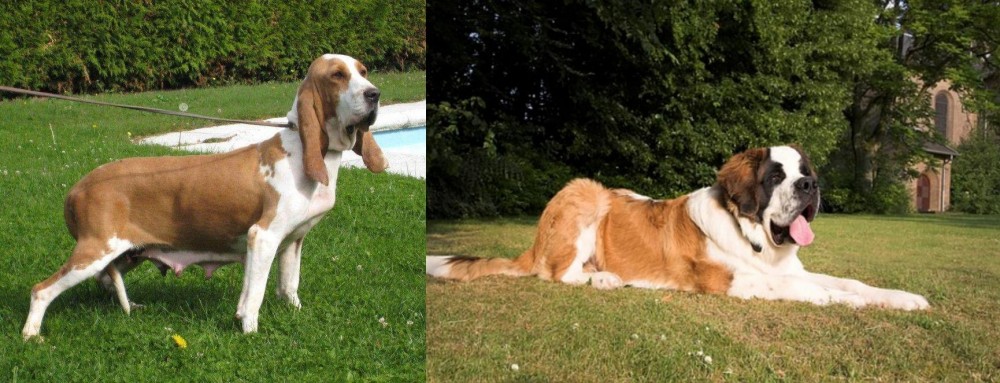 Sabueso Espanol is originated from Spain but St. Bernard is originated from Switzerland. Sabueso Espanol may grow 13 cm / 5 inches shorter than St. Bernard. Sabueso Espanol may weigh 65 kg / 143 pounds lesser than St. Bernard. Both Sabueso Espanol and St. Bernard has almost same life span. Sabueso Espanol may have less litter size than St. Bernard. Sabueso Espanol requires Low Maintenance. But St. Bernard requires High Maintenance
Sabueso Espanol is originated from Spain but St. Bernard is originated from Switzerland. Sabueso Espanol may grow 13 cm / 5 inches shorter than St. Bernard. Sabueso Espanol may weigh 65 kg / 143 pounds lesser than St. Bernard. Both Sabueso Espanol and St. Bernard has almost same life span. Sabueso Espanol may have less litter size than St. Bernard. Sabueso Espanol requires Low Maintenance. But St. Bernard requires High Maintenance
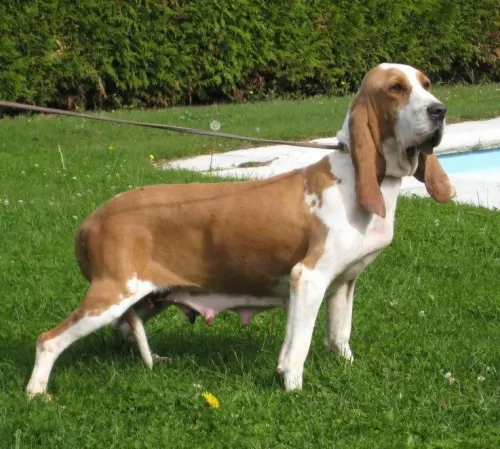 The Sabueso Español is a Spanish Scenthound, hailing from the Iberian Peninsula, Spain. Beyond Spanish borders, this dog is virtually unknown.
The Sabueso Español is a Spanish Scenthound, hailing from the Iberian Peninsula, Spain. Beyond Spanish borders, this dog is virtually unknown.
There isn’t much on its origins but it is believed that it may have developed from the bloodhound. The dog has been used for hundreds of years to hunt down wild boar, deer and all kinds of game. To this day it is essentially a hunting dog and not particularly used as a pet.
When he is on the hunt, he uses his baying bark to communicate with the pack. The dog is recognised by the UKC under the category ‘Scent Hound’.
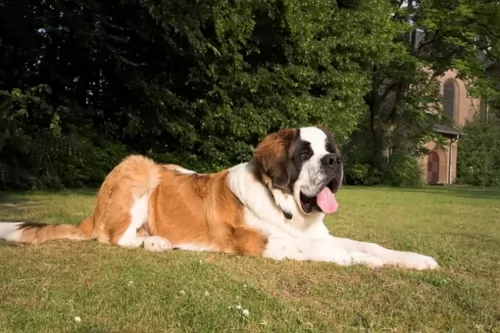 The St Bernard breed was once called the Alpine Cattle Dogs or the Alpine Mountain Dogs. They have always been farm dogs and mountain dogs in the French and Swiss Alps. They come from the border land of Switzerland and France. They were herding dogs, hunting, search and rescue, watchdogs and draft dogs.
The St Bernard breed was once called the Alpine Cattle Dogs or the Alpine Mountain Dogs. They have always been farm dogs and mountain dogs in the French and Swiss Alps. They come from the border land of Switzerland and France. They were herding dogs, hunting, search and rescue, watchdogs and draft dogs.
Their ancestors are considered to include the Sennenhunds and molosser breeds that came to the Alps with the ancient Romans. There are four Sennenhund breeds that are believed to have contributed to the original St. Bernard. These included the Greater Swiss Mountain Dog (Grosser Schweizer Sennenhund), the Appenzeller (Appenzeller Sennenhund), the Bernese Mountain Dog (Berner Sennenhund) and the Entlebucher Mountain Dog (Entlebucher Sennenhund) Today the St. Bernard is considered a Molossoid breed.
The first we know of the St. Bernard in any written records was in 1707 at the Great St. Bernard Pass and Great St. Bernard Hospice run by monks. There were found paintings of the dogs dating back into the late 1600’s. It is told that Barry saved upward of 100 people in the St. Bernard pass, and it is from these stories that the dogs gained their snow rescue reputation.
The St. Bernard of that time did not look like the St. Bernard does today as there was much crossbreeding. Many dogs dies during rescues in the avalanches of the mid 1800’s and so they Saint was crossed with the Newfoundland to preserve the breed. You can today see the resemblance in the build and looks of the two breeds. This cross brought about the long haired St. Bernard whose fur was too heavy for rescues.
The St. Bernards of mountain rescue fame were only about the size of a German Shepherd dog and were short haired. After crossing with the Newfoundland and moving into clubs and dogs shows, they have been bred to be much larger. Before the stud book was closed, it is thought that many larger breeds such as the Greater Swiss Mountain Dog, the English Mastiff, the Tibetan Mastiff, the Rottweiler, the Great Pyrenees, the English Bulldog, the Great Dane, the Bernese Mountain Dog, the Boxer and the Caucasian Oycharka all contributed to today’s St. Bernard.
In 1884 The Swiss St. Bernard Club was founded and the breed entered the Swiss Stud book as its first entry in 1884. It was 1888 when the standard was approved and the breed became the national dog of Switzerland. Before the name St. Bernard came to be common, these dogs might be called, Barry Dogs, Alepnmastiff, Noble Steeds or Saint Dogs.
The dogs came to England in the early 1800s and to the United States soon after. They were recognized by the European kennel clubs first and by the early 1900’s they were the most popular breed in the AKC.
 Known also as the Spanish Hound, this medium-sized dog stands at between 47 and 58cm in height ad weighs 23 to 25kg.
Known also as the Spanish Hound, this medium-sized dog stands at between 47 and 58cm in height ad weighs 23 to 25kg.
The dog has very long ears, the eyes are amber colored and the long tail is thin ad whip-like. The coat is short and smooth and is mostly white with orangey, lemon or reddish brown patches.
People think that because these dogs are such excellent hunting dogs, they can't be a good pet, but they are calm and loving, making an excellent companion dog.
He is also good with children in the home. He will just need to be trained and socialized if you want him to be well mannered and obedient as he is independent and can be stubborn.
 Today’s St. Bernard is not a large dog, he is a giant dog. Weighing in at 140-200 pounds and standing 28 to 35 inches tall, he is a lot of dog. Bred with mastiffs and large mountain dogs, they have proportional and powerful build. They are strong, sturdy and well muscled. They have either a smooth or rough (short or long) coat. Their eyes are brown or occasionally blue. They have tight lids, and square heads and muzzles.
Today’s St. Bernard is not a large dog, he is a giant dog. Weighing in at 140-200 pounds and standing 28 to 35 inches tall, he is a lot of dog. Bred with mastiffs and large mountain dogs, they have proportional and powerful build. They are strong, sturdy and well muscled. They have either a smooth or rough (short or long) coat. Their eyes are brown or occasionally blue. They have tight lids, and square heads and muzzles.
There are two coat types called smooth and rough, or short and long. The smooth shorter coat is tough, flat and close against the body and the long, rough coat is dense, wavy and heavy around the legs, neck and ruff. Both types have long tails that hang low and are heavy. Saints are known to slobber, drool and snore.
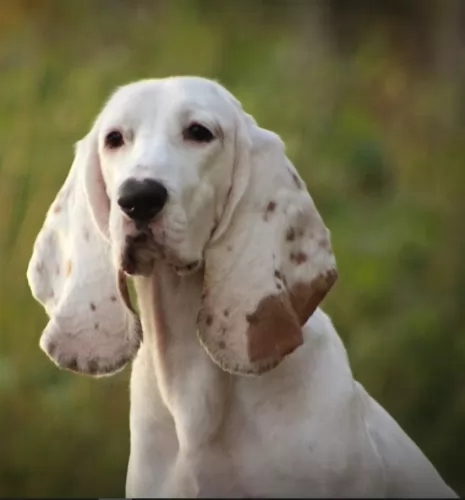 The attractive Sabueso Español is a calm, amicable, sweet dog that is loving towards his human owners. He is good with children but would prefer older children who know how to be kind and gentle towards him.
The attractive Sabueso Español is a calm, amicable, sweet dog that is loving towards his human owners. He is good with children but would prefer older children who know how to be kind and gentle towards him.
He isn’t aggressive and will get on well with other dogs in the house too. He is essentially an outdoor dog and will love nothing more than to have his family involved with him with activities outside.
If you’re looking for a great pet and companion for home and outdoor life, this dog is a superb choice.
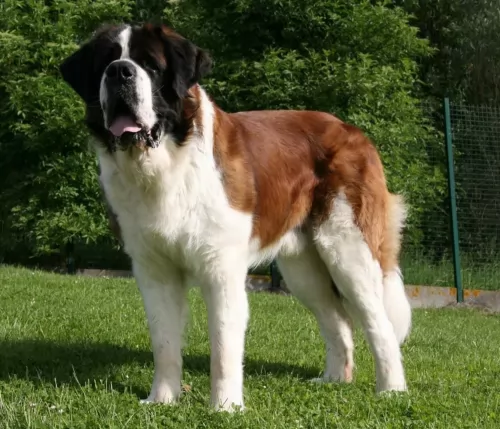 3.Adaptability no - these are giant dogs that need a lot of room. A large fenced yard or farm is best. They won’t do well in an apartment. They need exercise every day and loping around a yard is very good for them. They love to play in the snow, carry a backpack or pull a cart. They love to have a “job”
3.Adaptability no - these are giant dogs that need a lot of room. A large fenced yard or farm is best. They won’t do well in an apartment. They need exercise every day and loping around a yard is very good for them. They love to play in the snow, carry a backpack or pull a cart. They love to have a “job”
4.Learning ability – They are smart and highly trainable if motivated. They may appear lazy but they are just laid back and need a motivation.
 The Sabueso can live to be 12 years of age, but it is still good to be aware of typical dog illnesses that he can succumb to.
The Sabueso can live to be 12 years of age, but it is still good to be aware of typical dog illnesses that he can succumb to.
Hound dogs with floppy ears are known for getting ear infections. This is because floppy eared dogs don’t get the right amount of air circulation, and excess wax, dirt and moisture cause problems within the ear.
Excess body fat with a dog can create problems for your dog. Obesity is common in all dogs and dogs of all ages. Dogs that are obese don’t want to exercise. Obesity can cause a host of problems with your dog and even reduce his lifespan.
 The first problem this breed faces is how fast they grow and gain weight. This can lead to serious health issues if not controlled. Their bones can be damaged by this excessively fast rate of growth. Other issues facing the breed include:
The first problem this breed faces is how fast they grow and gain weight. This can lead to serious health issues if not controlled. Their bones can be damaged by this excessively fast rate of growth. Other issues facing the breed include:
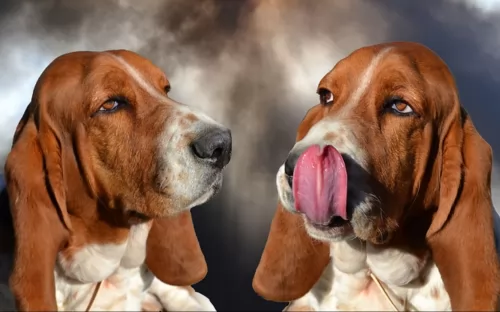 The short coat of the Sabueso Español makes him a low maintenance dog. and a brush twice a week is enough to keep his coat in tip top condition. As you brush him, make sure to check for any odd, new lumps you come across.
The short coat of the Sabueso Español makes him a low maintenance dog. and a brush twice a week is enough to keep his coat in tip top condition. As you brush him, make sure to check for any odd, new lumps you come across.
Check inside his ears, take a look at his eyes and make sure they’re bright and clear.
Look inside his mouth. He has no way of telling you if he has a rotten tooth causing him pain, and he relies on you to check on this for him.
Provide him with a dry, warm, comfortable bed.
These dogs are known for their stamina and energy and will ideally suit a home on a large property and not a small property in the city. They need lots of open spaces and plenty of exercise. They love long walks, preferably vigorous hikes, swimming and ball and rope games.
Ensure he is neutered or spayed if you want to avoid puppies.
Make sure his vaccinations are up to date to prevent deadly canine diseases.
Your Sabueso Espanol needs a nutritious diet if he is to remain healthy and happy. Commercially manufactured dog foods can be a good choice if you go for the high quality ones packed with vitamins and minerals. They can be convenient and well balanced. To provide your dog with some variety, provide him with some home-made food added into the dry kibble from time to time. No need to make home-made food all complicated and involved. Simply boil chicken, brown rice, sweet potatoes, carrots and spinach together, chopping it all up, and adding little bits of this to your dog's dry kibble twice a week. This will keep him happy and healthy. Try to include a bit of raw meat occasionally and never let your dog be without a constant source of fresh, cool water.
 1.Feeding the puppy – You want to control their growth. Do not overfeed, and make sure they exercise but not too much. Feed a high quality large breed puppy food 3-4 X a day in small amounts.
1.Feeding the puppy – You want to control their growth. Do not overfeed, and make sure they exercise but not too much. Feed a high quality large breed puppy food 3-4 X a day in small amounts.
2.Feeding the adult – The problem you face with he adult St. Bernard is the potential for Bloat. Don’t over feed. Don’t feed before or after strenuous exercise. Feed 2-3 X a day in smaller amounts to prevent Bloat. Feed a high quality breed specific food if possible or an extra large breed formula.
4. Games and Exercises They need exercise but not as much as you might think. The St. Bernard is a laid back lumbering character so don’t over exercise her. They enjoy weight and cart pulling but they are not athletes who enjoy frisbee or agility. Search and rescue trials and tracking trials are perfect athletic endeavors for them.